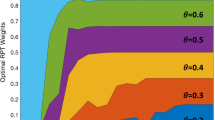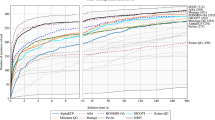Abstract
We examine the winner determination problem for combinatorial auctions with sub-cardinality constraints (WDP-SC). In this type of auction, bidders submit bids for packages of items of interest together with a specific number of items they want. All items in a package are equally acceptable, but each bidder wants only the specified number of items in their package and not necessarily all. This type of auction is particularly relevant in cases where bidders are interested in items in close proximity to one another and view items as largely substitutable. We show that WDP-SC is NP-hard. We then develop an integer programming (IP) formulation and two approximation algorithms for solving WDP-SC: one based on simulated annealing (SA) and one based on the Metaheuristic for Randomized Priority Search (Meta-RaPS). We assess the performance of these three methods through computational tests performed on sets of large benchmark problems (ranging from 1000 to 10,000 bids) generated from four different distributions: two developed specifically to simulate proximity concerns, and two others previously used in the literature. IP produced the best solutions for 1000-bid problems, but in many cases SA and Meta-RaPS produced better solutions than IP on larger problems. Both IP and Meta-RaPS appear to be robust solution methods for this problem and consistently produced high-quality solutions across all problem sizes and distributions.
Similar content being viewed by others
References
Andersson, A., Tenhunen, M., & Ygge, F. (2000). Integer Programming for Combinatorial Auction Winner Determination. In Proceedings of Fourth International Conference on MultiAgent Systems, doi:10.1109/ICMAS.2000.858429.
Ausubel, L., Crampton, P., McAfee, R., & McMillan, J. (1997). Synergies in wireless telephony: Evidence from the broadband PCS auctions. Journal of Economics and Management Strategy, 6(3), 497–527.
Boughaci, D., Benhamou, B., & Drias, H. (2010). Local search methods for the optimal winner determination problem in combinatorial auctions. Journal of Mathematical Modelling and Algorithms, 9(2), 165–180.
Boutilier, C. and Hoos, H (2001). Bidding languages for combinatorial auctions. In Proceedings of the Seventeenth International Joint Conference on Artificial intelligence, (pp. 1211–1217) Seattle, WA.
DePuy, G., & Whitehouse, G. E. (2001). A simple and effective heuristic for the multiple resource allocation problem. International Journal of Production Research, 32(4), 24–31.
DePuy, G. W., Moraga, R. J., & Whitehouse, G. E. (2005). Meta-RaPS: A simple and effective approach for solving the traveling salesman problem. Transportation Research Part E: Logistics and Transportation Review, 41(2), 115–130.
Dulluri, S., & Raghavan, S. (2005). Allocation of advertising space by a web service provider using combinatorial auctions. Sadhana, 30(2–3), 213–230.
Fukuta, N., & Ito, T. (2006). Towards Better Approximation of Winner Determination for Combinatorial Auctions with Large Number of Bids. In Proceedings of the IEEE/WIC/ACM International Conference on Intelligent Agent Technology, 2006, doi:10.1109/IAT.2006.123.
Garcia, C., & Rabadi, G. (2013). Exact and approximate methods for parallel multiple-area spatial scheduling with release times. OR Spectrum, 35(3), 639–657.
Garey, M. R., & Johnson, D. S. (1979). Computers and intractability: A guide to the theory of NP-Completeness. San Francisco: V.H. Freeman and Company.
Gan, R., Guo, Q., Chang, H., and Yi, Y. (2007). Ant Colony Optimization for Winner Determination in Combinatorial Auctions. In Proceedings of the T hird International Conference on Natural Computation (ICNC 2007, doi:10.1109/ICNC.2007.242.
Gorbanzadeh, F., & Kazem, A. A. P. (2012). Hybrid genetic algorithms for solving winner determination problem in combinatorial double auction in grid. International Journal of Artificial Intelligence, 1(2), 54–62.
Guo, Y., Lim, A., Rodrigues, B., & Tang, J. (2006). Using a Lagrangian heuristic for a combinatorial auction problem. International Journal of Artificial Intelligence Tools,. doi:10.1142/S0218213006002771.
Hoos, H. and Boutilier, C. (2000). Solving Combinatorial Auctions using Stochastic Local Search. In Proceedings of the Seventeenth National Conference on Artificial Intelligence, (pp. 22–29) Austin, TX.
Hsieh, F. (2007). Combinatorial auction with minimal resource requirements. Lecture Notes in Computer Science, 4570, 1072–1077.
Hsieh, F. (2010). Combinatorial reverse auction based on revelation of Lagrangian multipliers. Decision Support Systems, 48(2), 323–330.
Karp, R. M. (1972). Reducibility among combinatorial problems. In R. E. Miller & J. W. Thatcher (Eds.), Complexity of computer computations (pp. 85–103). New York: Plenum.
Kirkpatrick, S., Gelatt, C. D, Jr, & Vecchi, M. P. (1983). Optimization by simulated annealing. Science, 220(4598), 671–680.
Lan, G., Depuy, G. W., & Whitehouse, G. E. (2007). An effective and simple heuristic for the set covering problem. European Journal of Operational Research, doi:10.1016/j.ejor.2005.09.028.
Leyton-Brown, K., & Shoham, Y. (2006). A test suite for combinatorial auctions. In P. Crampton, Y. Shoham, & R. Steinberg (Eds.), Combinatorial auctions (pp. 853–903). Boston: MIT Press.
Mochon, A., Saez, Y., Gómez-Barroso, J. L., & Isasi, P. (2011). The clock proxy auction for allocating radio spectrum licenses. Computational Economics, 37(4), 411–431.
Moraga, R.J. (2002). Meta-RaPS: An Effective Solution Approach for Combinatorial Problems, Ph.D. thesis, University of Central Florida, Orlando, FL.
Moraga, R. J., DePuy, G. W., & Whitehouse, G. E. (2005). Meta-RaPS approach for the 0–1 multidimensional knapsack problem. Computers and Industrial Engineering, 48(2), 83–96.
Nisan, N (2000). Bidding and Allocation in Combinatorial Auctions. In 2nd ACM conference on electronic commerce, doi:10.1145/352871.352872.
Plott, C., & Cason, T. (1996). EPA’s new emissions trading mechanism: A laboratory evaluation. Journal of Environmental Economics and Management, 30(2), 133–160.
Patodi, P., Ray, A. K., & Jenamani, M. (2011). GA based winner determination in combinatorial reverse auction. In Proceedings of the Second International Conference on Emerging Applications of Information Technology, doi:10.1109/EAIT.2011.80.
Quan, D. (1994). Real estate auctions: A survey of theory and practice. Journal of Real Estate Finance and Economics, 9(1), 23–49.
Rabadi, G., Moraga, R., & Al-Salem, A. (2006). Heuristics for the unrelated parallel machine scheduling problem with setup times. Journal of Intelligent Manufacturing, 17, 85–97.
Rassenti, S. J., Smith, V. L., & Bulfin, R. L. (1982). A combinatorial auction mechanism for airport time slot allocation. The Bell Journal of Economics, 13(2), 402–417.
Rothkopf, M., Pekec, A., & Harstad, R. (1998). Computationally manageable combinatorial auctions. Management Science, 44(8), 1131–1147.
Sandholm, T. (1999). An algorithm for optimal winner determination in combinatorial auctions. In Proceedings of the Sixteenth International Joint Conference on Artificial Intelligence (pp. 542–547), Stockholm, Sweden, (1999).
Sandholm, T. (2000). eMediator: a next generation electronic commerce server. In Proceedings of the Fourth International Conference on Autonomous Agents (pp. 341–348), Barcelona, Spain (2000).
Sandholm, T., Suri, S., Gilpin, A., and Levine, D. (2001). CABOB: A fast optimal algorithm for combinatorial auctions. In Proceedings of the Seventeenth International Joint Conference on Artificial Intelligence (pp. 1102–1108), Seattle, WA, (2001).
Sandholm, T. (2002). Algorithm for optimal winner determination in combinatorial auctions. Artificial Intelligence, 135(1–2), 1–54.
Schwind, M., Stockheim, T., Rothlauf, F. (2003). Optimization heuristics for the combinatorial auction problem. In The 2003 Congress on Evolutionary Computing. doi:10.1109/CEC.2003.1299862 (2003).
Wu, L., & Wang, Y. (1998). An introduction to simulated annealing algorithms for the computation of economic equilibrium. Computational Economics, 12(2), 151–169.
Author information
Authors and Affiliations
Corresponding author
Rights and permissions
About this article
Cite this article
Garcia, C. Winner Determination Algorithms for Combinatorial Auctions with Sub-cardinality Constraints. Comput Econ 47, 401–421 (2016). https://doi.org/10.1007/s10614-015-9496-5
Accepted:
Published:
Issue Date:
DOI: https://doi.org/10.1007/s10614-015-9496-5




